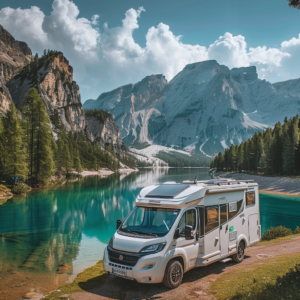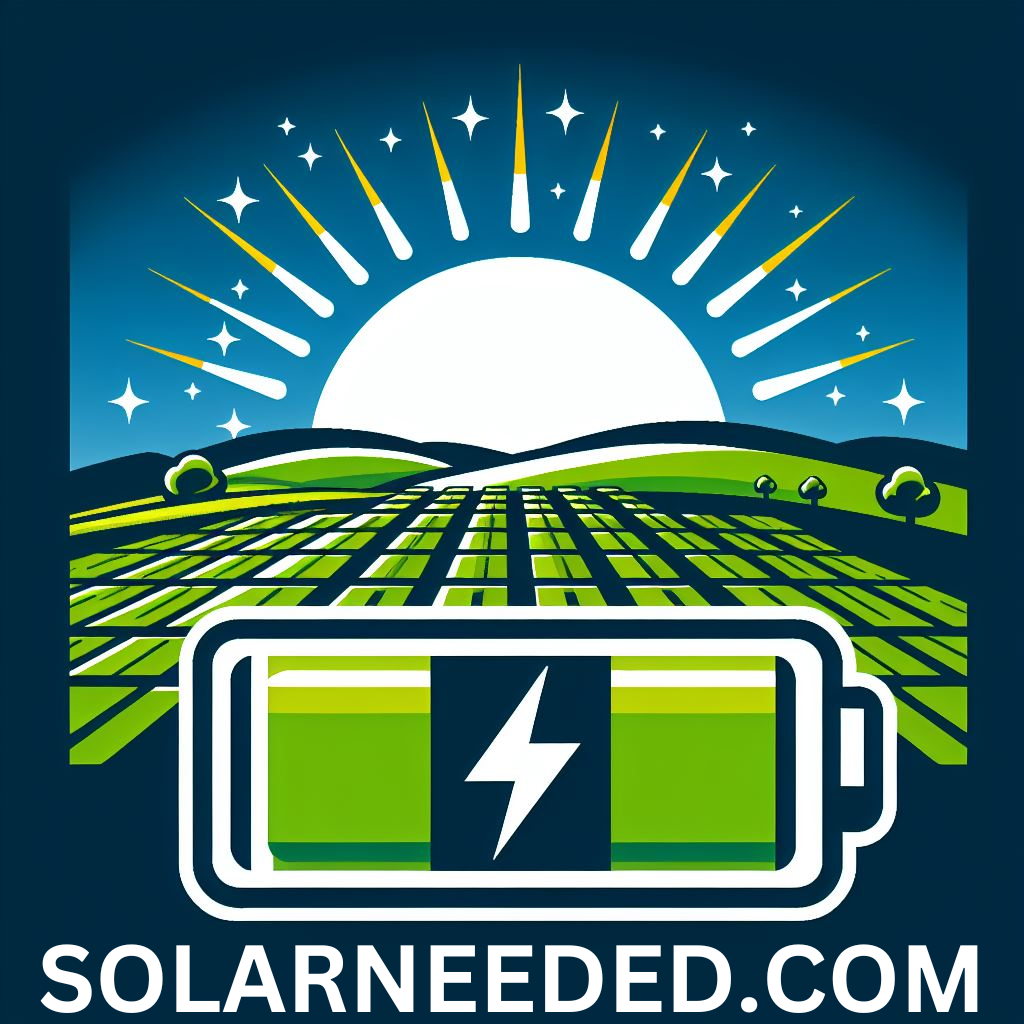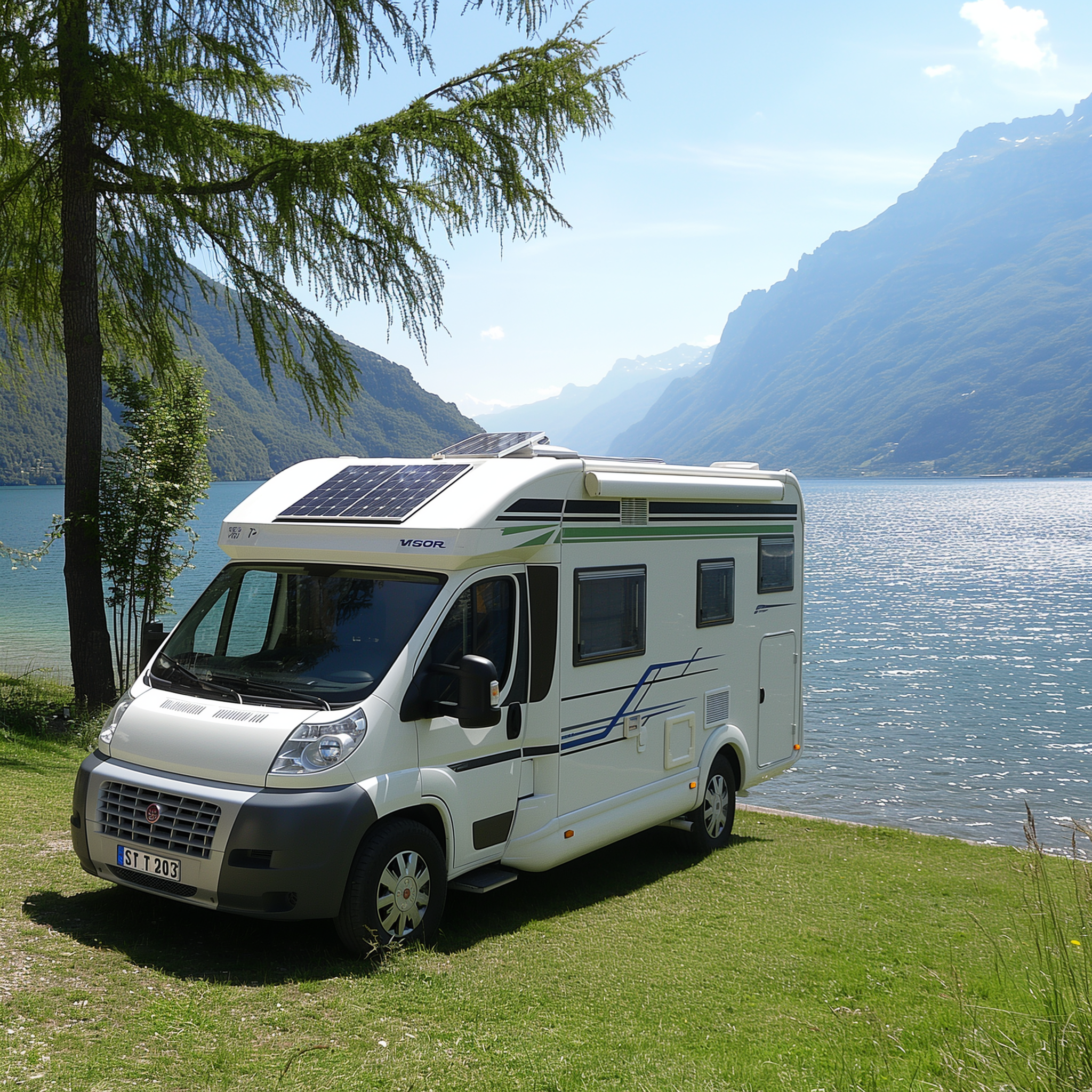Embracing a Greener and More Cost-Effective Journey
Bask in the beauty of nature while enjoying the comforts of a motorhome, all while being environmentally conscious and saving money. With solar kits, you can achieve just that. These innovative kits provide a sustainable and cost-saving solution for powering your motorhome.
Harnessing the power of the sun, solar kits convert sunlight into electricity, allowing you to run your appliances and charge your devices without relying on traditional power sources. Not only does this reduce your carbon footprint, but it also frees you from the constraints of campsites with electrical hookups.
The benefits of solar kits for motorhomes are numerous. By generating your own clean energy, you save on fuel costs and eliminate the need for noisy generators. Solar energy is renewable and abundant, meaning your power supply is virtually unlimited as long as the sun rises.
Investing in a solar kit is not only a smart environmental choice but also a practical financial decision. Imagine the savings you’ll enjoy over time as you rely less on costly electricity providers and embrace the energy of the sun.
Choosing a solar kit that suits your motorhome’s energy needs isn’t easy. We hope this article will be helpful enough to get you to embark on a greener, more independent journey soon.
Benefits of using solar kits for motorhomes
Solar kits offer a wide range of benefits for motorhome owners. Let’s take a closer look at some of the key advantages:
- Reduced fuel costs and noise pollution: One of the primary benefits of using solar kits for your motorhome is the significant reduction in fuel costs. By harnessing the power of the sun, you can power your appliances and devices without relying on gasoline or diesel generators, saving you money in the long run. Additionally, solar kits operate silently, eliminating the noise pollution typically associated with traditional generators.
- Independence from electrical hookups: With solar kits, you no longer need to rely on camping sites or RV parks with electrical hookups. This newfound freedom allows you to explore and camp in remote locations (commonly referred to as boondocking) that may not have access to electricity, giving you a more adventurous and off-grid experience. Whether you’re camping in the wilderness or enjoying a scenic spot by the beach, solar kits provide the power you need to stay comfortable and connected.
- Environmentally friendly: Perhaps the most significant benefit of using solar kits for your motorhome is the positive impact on the environment. Solar energy is clean and renewable, meaning it produces no harmful emissions or pollution during operation. By choosing solar power over traditional energy sources, you reduce your carbon footprint and contribute to a greener future. With climate change becoming an increasingly pressing issue, embracing solar energy is a responsible choice that helps protect our planet for future generations.
How solar kits work for motorhomes
Solar kits utilize photovoltaic (PV) technology to convert sunlight into electricity. Here’s a simplified breakdown of how solar kits work for motorhomes:
- Solar panels: The heart of a solar kit is the solar panels, which are typically made up of multiple interconnected solar cells. These cells contain semiconductors, usually made of silicon, that absorb sunlight and generate electricity through the photovoltaic effect.
- Charge controller: Solar kits also include a charge controller, which regulates the flow of electricity from the solar panels to the battery bank. The charge controller prevents overcharging and ensures that the batteries are charged efficiently, prolonging their lifespan.
- Battery bank: The electricity generated by the solar panels is stored in a battery bank. This allows you to have a continuous power supply even when the sun is not shining, such as during cloudy days or at night. The battery bank acts as a reservoir, storing excess energy for later use.
- Inverter: To power your appliances and devices, the DC (direct current) electricity stored in the battery bank needs to be converted into AC (alternating current) electricity. An inverter is used to perform this conversion, providing you with the power you need to run your motorhome’s electrical systems.
Harnessing the power of the sun and efficiently converting it into usable electricity, solar kits provide a reliable and sustainable energy source for your motorhome.

Choosing the right solar kit for your motorhome
When it comes to choosing the right solar kit for your motorhome, several factors need to be considered:
- Energy needs: Start by assessing your motorhome’s energy needs. Consider the appliances and devices you regularly use and their power requirements. This will help determine the size and capacity of the solar kit you need to adequately power your motorhome.
- Solar panel efficiency: Look for solar panels with high efficiency ratings. Higher efficiency panels convert a greater amount of sunlight into electricity, allowing you to generate more power from the same surface area. This is particularly important if you have limited space available for solar panel installation.
- Battery capacity: The battery bank is crucial for storing and supplying electricity when the sun is not shining. Opt for deep-cycle batteries with sufficient capacity to meet your motorhome’s energy demands. Consider factors such as battery lifespan, maintenance requirements, and the ability to withstand deep discharges.
- Charge controller and inverter quality: The charge controller and inverter play vital roles in the performance and longevity of your solar kit. Look for high-quality components that are designed for the specific voltage and power requirements of your motorhome. Investing in reliable and efficient components will ensure optimal performance and durability.
- Installation requirements: Consider the installation requirements of the solar kit. Some kits may require professional installation, while others are designed for easy DIY installation. Evaluate your skills and resources to determine the best option for your situation.
Carefully considering these factors, you can choose a solar kit that meets your motorhome’s energy needs and provides a reliable and efficient power source.
Installing a solar kit on your motorhome
Installing a solar kit on your motorhome may seem like a daunting task, but with proper planning and guidance, it can be a manageable DIY project. Here’s a step-by-step guide to help you get started:
- Evaluate your motorhome’s roof: Before installing solar panels, assess your motorhome’s roof to determine the best location for panel placement. Consider factors such as available space, shading from trees or other obstructions, and the orientation of your motorhome when parked.
- Calculate the number of panels: Based on your energy needs and the available roof space, calculate the number of solar panels required. Consider factors such as panel wattage, efficiency, and the angle at which they will be mounted to maximize sunlight exposure.
- Mounting the panels: Securely attach the solar panels to the roof using appropriate mounting brackets and hardware. Ensure that the panels are properly aligned and angled for optimal sun exposure. Follow the manufacturer’s instructions for proper installation.
- Wiring and connections: Connect the solar panels to the charge controller using suitable wiring and connectors. Follow the recommended wiring diagram(s) that comes in your manufacturer package to ensure all your connections are done properly and in a safe manner.
- Installing the charge controller and inverter: Mount the charge controller and inverter in a suitable location within your motorhome. Ensure proper ventilation and secure mounting to prevent damage during travel.
- Battery bank installation: Install the battery bank in a well-ventilated and secure location. Connect the batteries to the charge controller and inverter using appropriate wiring and connectors.
- Testing and fine-tuning: Once the installation is complete, test the system to ensure proper functioning. Monitor the solar kit’s performance and make any necessary adjustments to optimize its efficiency.
While installing a solar kit on your motorhome requires careful planning and attention to detail, the benefits of having a sustainable and independent power source far outweigh the initial effort.
Maintenance and care for your solar kit
To ensure the longevity and optimal performance of your solar kit, regular maintenance and care are essential. Here are some key maintenance tips:
- Regular cleaning: Keep the solar panels clean and free from dirt, debris, and any shading that may hinder sunlight absorption. Regularly inspect and clean the panels using a soft cloth or sponge and mild soapy water.
- Check for damage: Periodically inspect the solar panels, wiring, and connections for any signs of damage or wear. Look for loose connections, cracks, or physical damage that may affect the system’s performance.
- Battery maintenance: If your solar kit includes a battery bank, follow the manufacturer’s guidelines for battery maintenance. This may include checking the battery’s water levels, cleaning terminals, and ensuring proper charging and discharging cycles.
- Monitor performance: Keep track of your solar kit’s performance by monitoring its energy production and battery levels. This will help identify any issues or inefficiencies that may require attention.
- Professional servicing: If you encounter any significant issues or are unsure about performing maintenance tasks yourself, consult a professional solar technician. They can provide expert advice and ensure the proper functioning of your solar kit.
Following these maintenance practices, you can maximize the lifespan and efficiency of your solar kit, ensuring it continues to provide reliable power for your motorhome.
Cost-saving benefits of solar kits for motorhomes
Investing in a solar kit for your motorhome offers significant cost-saving benefits over time. Here’s how solar kits help you save money:
- Reduced fuel costs: By relying on solar power instead of traditional fuel-powered generators, you can save a substantial amount on fuel costs. Over time, these savings can add up, allowing you to allocate your travel budget to other expenses.
- Elimination of campground fees: With a solar kit, you become less reliant on electrical hookups at RV parks and campsites. This means you can opt for boondocking or dry camping, which often comes at a lower or even no cost. By embracing solar power, you have the freedom to camp in remote and scenic locations without worrying about campground fees.
- Lower maintenance costs: Solar kits require minimal maintenance compared to fuel-powered generators. With no need for oil changes, spark plug replacements, or other regular maintenance tasks associated with generators, you can save both time and money.
- Increased motorhome resale value: Adding a solar kit to your motorhome can increase its resale value. Many potential buyers value the cost-saving and environmental benefits of solar power, making your motorhome more attractive and potentially commanding a higher selling price.
- Long-term savings: While the initial investment in a solar kit may seem significant, it pays off in the long run. Solar panels have a lifespan of 25 years or more, meaning you can enjoy the benefits and savings for decades to come. As electricity prices continue to rise, your solar kit becomes an increasingly valuable asset.
Embracing solar power for your motorhome, you not only contribute to a greener future but also enjoy substantial cost savings in the process.
Environmental benefits of using solar kits for motorhomes
In addition to the cost-saving benefits, using solar kits for your motorhome has significant environmental advantages. Here’s how solar power benefits the environment:
- Reduced carbon footprint: Solar power is a clean and renewable energy source that produces no greenhouse gas emissions during operation. By relying on solar energy instead of fossil fuels, you significantly reduce your carbon footprint and help combat climate change.
- Conservation of natural resources: Solar power reduces the demand for non-renewable energy sources such as coal, oil, and natural gas. By utilizing the abundant energy of the sun, you contribute to the conservation of these valuable resources, ensuring their availability for future generations.
- Protection of ecosystems: Extracting and burning fossil fuels has detrimental effects on ecosystems, leading to habitat destruction, air and water pollution, and the loss of biodiversity. Solar power has minimal environmental impact, allowing you to enjoy the beauty of nature without causing harm.
- Noise pollution reduction: Traditional fuel-powered generators produce noise pollution that disturbs both wildlife and fellow campers. By using solar power, you eliminate the noise pollution associated with generators, creating a more peaceful and natural camping experience.
- Inspiration for sustainable living: By embracing solar power for your motorhome, you become an advocate for sustainable living. You inspire others to consider alternative energy sources and make conscious choices that benefit both the environment and their wallets.
When choosing solar power for your motorhome, you take an active role in protecting the environment and leaving a positive impact on the world around you.
Common misconceptions about solar kits for motorhomes
Despite the numerous benefits of solar kits for motorhomes, there are some common misconceptions that may deter people from embracing solar power. Let’s address a few of these misconceptions:
- Limited power generation: Some may believe that solar power cannot generate enough electricity to meet their motorhome’s energy needs. However, advancements in solar technology have made it possible to generate ample power even in less sunny regions. By choosing the right solar kit and optimizing its performance, you can enjoy a reliable power supply regardless of your location.
- High upfront costs: While the initial investment in a solar kit may seem substantial, it’s important to consider the long-term cost savings. Solar panels have a lifespan of 25 years or more, allowing you to recoup your investment over time. Additionally, various incentives and rebates may be available to help offset the upfront costs of installing a solar kit.
- Complex installation and maintenance: Another misconception is that installing and maintaining a solar kit is complicated and time-consuming. While proper installation requires careful planning, it can be a manageable DIY project with the right guidance. Additionally, solar kits require minimal maintenance compared to fuel-powered generators, making them a hassle-free and reliable energy solution.
- Limited usage during cloudy days: Cloudy weather does reduce the amount of sunlight available for solar power generation. However, modern solar panels are designed to capture diffuse sunlight, allowing them to generate electricity even on cloudy days. Additionally, the excess energy generated on sunny days can be stored in the battery bank for use during periods of low sunlight.
By dispelling these misconceptions, more motorhome owners can embrace the benefits of solar power and enjoy a greener and more sustainable journey.
Clearing the Clouds: Common Misconceptions Debunked
| Myth | Fact | |||||||
| Solar panels only work in direct, intense sunlight. | Solar panels generate electricity even on cloudy days, although with reduced efficiency. | |||||||
| Solar power systems are prohibitively expensive. | Though there’s an initial cost, solar becomes cost-saving. It significantly offsets the need for expensive hookups or generators. | |||||||
| You need a huge amount of space for solar power. | Technological advancements mean even modest solar setups can provide substantial power for RVs. | |||||||
| Solar power systems require constant maintenance. | Modern solar systems are remarkably low-maintenance, typically requiring occasional cleaning and basic checks. | |||||||
| Installing solar means going completely off-grid. | Many RVs use solar to supplement traditional systems, offering increased freedom and reducing reliance on external power sources. | |||||||
| Solar panels are fragile and not suited for RV life. | RV-grade solar panels are constructed to withstand road conditions, including shocks, vibrations, and weather exposure. | |||||||
Embrace the Solar Future: A Brighter Horizon Awaits
In conclusion, solar kits offer motorhome travelers a sustainable and cost-effective alternative to traditional power sources. By harnessing the power of the sun, adventurers can enjoy unparalleled freedom, quiet energy independence, and environmental stewardship on their journeys. With careful consideration, proper installation, and ongoing maintenance, embracing solar power transforms the motorhome experience into a greener and more sustainable adventure. So, why wait? Let the sun power your next expedition and embark on a journey to a brighter future, one solar panel at a time.

